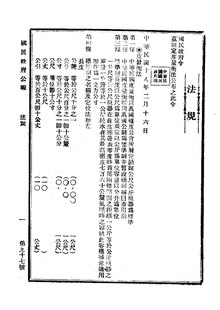Li (short)
The li (simplified Chinese: 厘; traditional Chinese: 釐; pinyin: lí) in Mandarin, or lei in Cantonese, is a traditional Chinese unit of length. One li equals 10 hao, 1/10 of a fen, 1/1000 of a chi, or 1/3 mm in China. [1] [2]
Chinese length units promulgated in 1915
| Pinyin | Character | Relative value | Metric value | Imperial value | Notes |
|---|---|---|---|---|---|
| háo | 毫 | 1⁄10000 | 32 μm | 0.00126 in | |
| lí | 釐 (T) or 厘 (S) | 1⁄1000 | 0.32 mm | 0.0126 in | |
| fēn | 分 | 1⁄100 | 3.2 mm | 0.126 in | |
| cùn | 寸 | 1⁄10 | 32 mm | 1.26 in | Chinese inch |
| chǐ | 尺 | 1 | 0.32 m | 12.6 in | Chinese foot |
| bù | 步 | 5 | 1.6 m | 5.2 ft | Chinese pace |
| zhàng | 丈 | 10 | 3.2 m | 3.50 yd | Chinese yard |
| yǐn | 引 | 100 | 32 m | 35.0 yd | |
| lǐ | 里 | 1800 | 576 m | 630 yd | Chinese mile, this li is not the small li above, which has a different character and tone |
Present law on Chinese length units

This law of length measurement was issued by the Chinese government in 1929, and has been effective since 1 January, 1930. The base unit chi is defined to be 1/3 meter.[4][5]
| Pinyin | Character | Relative value | Metric value | Imperial value | Notes |
|---|---|---|---|---|---|
| háo | 毫 | 1⁄10 000 | 33+1⁄3 μm | 0.00131 in | Chinese mil |
| lí | 釐 (T) or 厘 (S) | 1⁄1000 | 1⁄3 mm | 0.0131 in | Chinese calibre |
| fēn | 市分 | 1⁄100 | 3+1⁄3 mm | 0.1312 in | Chinese line |
| cùn | 市寸 | 1⁄10 | 3+1⁄3 cm | 1.312 in | Chinese inch |
| chǐ | 市尺 | 1 | 33+1⁄3 cm | 13.12 in | Chinese foot |
| zhàng | 市丈 | 10 | 3+1⁄3 m | 3.645 yd | Chinese yard |
| yǐn | 引 | 100 | 33+1⁄3 m | 36.45 yd | Chinese chain |
| lǐ | 市里 | 1500 | 500 m | 546.8 yd | Chinese mile, this li is not the small li above, which has a different character and tone |
Chinese length units in engineering
These units are based on the metric system. The Chinese word for metre is 米 mǐ, which can take the Chinese standard SI prefixes (for "kilo-", "centi-", etc.). A kilometre, however, may also be called 公里 gōnglǐ, i.e. a metric lǐ. In the engineering field, traditional units are rounded up to metric units. [6] [7]
| Pinyin | Character | Relative value | Metric value | Imperial value | Notes |
|---|---|---|---|---|---|
| hū | 忽 | 1⁄1000000 | 1 μm | Authorized name: 微米 | |
| sī | 絲 (T) or 丝 (S) | 1⁄100000 | 10 μm | Authorized name: 忽米 | |
| háo | 毫 | 1⁄10000 | 100 μm | Authorized name: 絲米 (T) or 丝米 (S) | |
| lí | 釐 (T) or 厘 (S) | 1⁄1000 | 1 mm | Authorized name: 毫米 | |
| fēn | 公分 | 1⁄100 | 10 mm | Authorized name: 釐米(T) or 厘米(S) | |
| cùn | 公寸 | 1⁄10 | 100 mm | Authorized name: 分米 | |
| chǐ | 公尺 | 1 | 1 m | Authorized name: 米 | |
| Zhàng | 公丈 | 10 | 10 m | Authorized name: 十米 | |
| yǐn | 公引 | 100 | 100 m | Authorized name: 百米 | |
| lǐ | 公里 | 1000 | 1000 m | this li is not the small li above, which has a different character and tone |
Compounds
See also
References
- ^ Language Institute, Chinese Academy of Social Sciences (2020). 新华字典 (附录:计量单位简表)(Xinhua Dictionary (Appendix: Brief table of measurement units)) (in Chinese) (12th ed.). Beijing: The Commercial Press. p. 696. ISBN 978-7-100-17093-2.
- ^ https://en.wiktionary.org/wiki/釐
- ^ "權度法 [Quándù Fǎ]", 政府公報 [Zhèngfǔ Gōngbào, Government Gazette], vol. 957, Beijing: Office of the President, 7 January 1915, pp. 85–94[permanent dead link]. (in Chinese)
- ^ a b "The Weights and Measures Act (1929)". Legislative Yuan. Archived from the original on 2014-04-25.
- ^ Language Institute, Chinese Academy of Social Sciences (2016). 現代漢語詞典 (Contemporary Chinese Dictionary) (in Chinese) (7th ed.). Beijing: Commercial Press. p. 1789. ISBN 978-7-100-12450-8.
- ^ (in Chinese) 1981 Gazette of the State Council of the People's Republic of China Archived 2012-01-11 at the Wayback Machine, No. 365 Archived 2014-11-04 at the Wayback Machine, page 575, Table 7: SI prefixes
- ^ "法定度量衡單位及前綴詞" (PDF). bsmi.gov.tw. 31 October 2023. Archived from the original (PDF) on 13 January 2024.
- ^ "《重編國語辭典修訂本》臺灣學術網路第六版 ("Revised Edition of the Chinese Dictionary" Taiwan Academic Network Sixth Edition)". 中華民國教育部 (Ministry of Education of the Republic of China).
